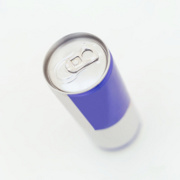 Photo: Getty Images
Photo: Getty Images
This year, the energy drink market is expected to earn more than $9 billion. Also, energy drinks are the fastest growing beverage market in the U.S. Research suggests that more than one-third of adolescents and young adults consume energy drinks, and overall, more than half the energy drink market is under 25 years of age.
A new study in the American Academy of Pediatrics is raising the alarm about kids and energy drinks, saying kids and teens should not drink them at all.
Researchers said some energy drinks are giving kids an unsafe amount of caffeine. Doctors say there were twice as many cases of caffeine toxicity in kids than adults.
In the U.S. and abroad, there have been reports of energy drink overdoses in children as young as five. And in some cases energy drink overdoses have resulted in seizures and strokes. Additionally, energy drink-related symptoms include hallucinations, rapid heart rate, chest pain, high blood pressure and irritability.
Medical experts say kids under 18 should not have more than 100 mg of caffeine per day. The recommendation for adults is 400 mg of caffeine per day.
For example, a can of Coca-Cola has 35 mg of caffeine and a cup of coffee has 100 mg of caffeine.
But an energy drink like Monster has 165 mg of caffeine or the same amount of caffeine as four cans of Coca-Cola. And the energy drink Jolt has 280 mg of caffeine or the same amount of caffeine as eight cans of Coca-Cola.
All energy drinks are over the counter and anyone can purchase them. But no one seems to be regulating the energy drinks. Granted, the U.S. Food and Drug Administration does limit caffeine to 71 mg per 12-ounce soft drink. However, energy drinks get around the FDA rule because beverage companies consider energy drinks a supplement.
Also, the report confirmed that some cans of energy drinks have four to five times more caffeine than soda.
The American Association of Poison Control Centers adopted codes late in 2010 to start tracking energy drink overdoses and side effects nationwide; 677 cases occurred from October through December; so far, 331 have been reported in 2011.
Also, the report found that high caffeine content has been associated with serious adverse effects especially in youngsters who have underlying health condition.
Do you let your teenager have energy drinks like Red Bull and Jolt?
Sources:
http://abcnews.go.com/Health/report-shows-energy-drinks-harm-children/story?id=12901333
http://www.msnbc.msn.com/id/41577256/ns/health-kids_and_parenting/





Add a CommentComments
There are no comments yet. Be the first one and get the conversation started!